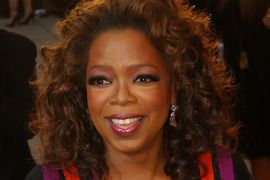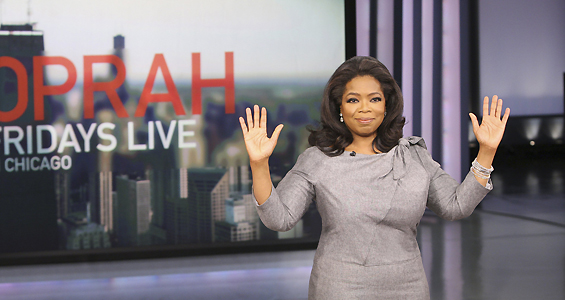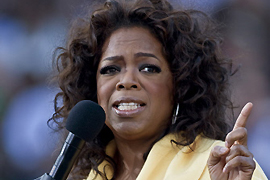Oprah, close and personal
Covering a crime story in 1981, Rob Reynolds came across a TV anchor with a burning ambition to succeed.

 |
| Holding back tears, Oprah Winfrey told her studio audience in Chicago on Friday that she would end her show in 2011 after a quarter century on the air [Reuters] |
Long, long ago, in an era shrouded by the mists of time – okay, in 1981 – I got my first job in television news. WJZ, Baltimore’s proud Channel Thirteen, was a great place for an apprenticeship.
As I toiled on the assignment desk, calling the homicide squad for the daily murder roundup and fielding calls from viewers who wanted our news team to cover their children’s birthday parties, I met another relative newcomer to the newsroom.
Keep reading
list of 4 itemsThousands protest against Israel’s participation in Eurovision final
Israel qualifies for Eurovision final amid Gaza war protests
Slum to stardom: Indonesian film director Joko Anwar is riding high
|
Al Jazeera’s Patty Culhane reports on why Oprah Winfrey’s goodbye may also be a hello |
She was an impressive young woman with a regal bearing, a beautiful enunciation, and an odd name: Oprah Winfrey.
Oprah co-anchored the news at noon back then, and did an afternoon talk show on local Bawlmer topics with co-host Richard Sher.
Occasionally, when staff was stretched thin, Oprah would be sent into the field to cover stories, and lowly assignment desk grubs like myself would be sent out as producers.
Baltimore was a rough, violent town back then (it still is) and many of our stories were about crime.
So it came to pass that one afternoon Oprah and I were sent out to make a story out of a depressing scene: a Korean corner-shop owner, gunned down behind the counter and robbed of a few dollars by some thug. I think it was on Fayette Street.
Oprah and I stared at the police crime scene tape and cops milling around, and our cameraman (as usual) did the real work.
After we had got what we needed and were getting ready to leave, Oprah turned to me and said “Rob, this is really not my thing.” Ambition emanated from her like shimmering heat waves in a desert.
Media mogul
A few months later, Oprah left for Chicago, and I left for Washington, and eventually for London and Moscow and Baghdad and Belfast and Port-au-Prince and Mogadishu and other places.
Oprah become a media super-superstar and one of the most influential women on the planet; I went around the world covering wars and politics, apparently influencing very little. Oprah established a far flung empire worth nearly $3 billion; I … Well, let’s not go there.
 |
| From film star to media mogul, Oprah has built an empire worth $3 billion [AFP] |
Oprah has now announced, tearfully, that she will end her syndicated talk show in 2011, after 25 years.
The news was at the top of the American television news programmes and on front page headlines in newspapers. Oprah is a big deal.
I think Oprah deserves enormous credit. Through the force of sheer talent and personality, she rose from a troubled childhood to immense fame and fortune.
She broke down racial and gender discrimination barriers and overcame extremely high odds as a black woman making it to the very pinnacle of American life.
Yet at the same time, Oprah has been a prime enabler of the coarsening and homogenisation of American life.
|
“When [Oprah] began her meteoric rise, it was unthinkable that people would openly discuss intimate sexual or other personal details in public in America; now, there are whole subsections of the media devoted to sex tapes and celebrity rehab” Rob Reynolds, Al Jazeera correspondent |
She herself was rarely crude, but her shows were very often on sensational topics or featuring people caught in freakishly horrible situations.
In recent days, one of her two top guests was a woman who, some months earlier, had her face torn off by an enraged chimpanzee. The other one was Sarah Palin.
The Oprah Show and its numberless imitators helped grind down public discourse and discretion in this country.
When she began her meteoric rise, it was unthinkable that people would openly discuss intimate sexual or other personal details in public in America; now, there are whole subsections of the media devoted to sex tapes and celebrity rehab.
Oprah was instrumental in fostering the moronic obsession with celebrity that has now, like some hideous alien fungus, thoroughly pervaded every corner of American popular “culture”.
Hourly, I am confronted, on TV or online, with breathless bulletins about the lives of incredibly famous personalities I have never heard of. Heidi Klum? Kim Kardashian? Chris Brown? Who are these people? Why should I, or anyone else, care about them?
But Oprah paved the way, becoming famous by virtue of being famous.
Powerful rotor
Today in America we have a culture awash in easy notions of confession and redemption; this, too, is one of Oprah’s legacies.
Her studio and comfy sofa provided a stage upon which any fallen idol, Hollywood or otherwise, could tearfully blurt out a story of drugs, sex, gluttony or some other secret vice, and be rewarded by applause and a warm embrace in Oprah’s ample bosom.
In her later years, Oprah became a powerful rotor in the vast machinery of the entertainment-industrial complex. Stars appeared to shill their movies, musicians flogged new albums.
Oprah’s Book Club became the single most powerful force in the American publishing industry. Once a new novel had been given Oprah’s queenly imprimatur, her legions of zombie-like acolytes march out in dutiful obedience to purchase the hardcover volumes.
Of course, Oprah has no intention of fading away from the spotlight.
She is starting up her own cable network. If anything, I expect her empire will expand its tentacles curling around the globe.
Yet today, as I watch the fawning tributes to Oprah and the tearful tributes from her fans, I cannot help thinking back to that day in 1981, and that miserable, impoverished street in Baltimore, after a sad and shocking spasm of violence.
Maybe that was the day Oprah decided to move on, and move up.
Fayette street was definitely not her thing.